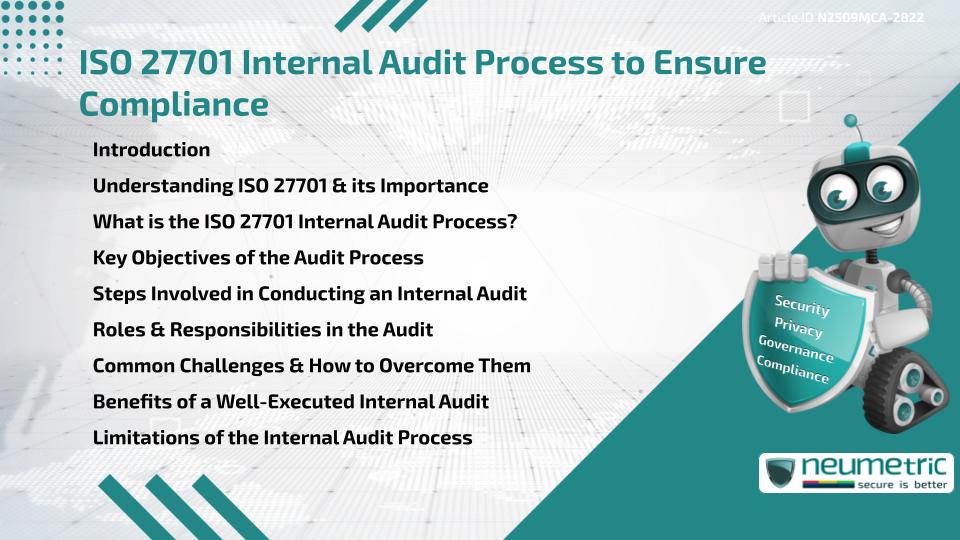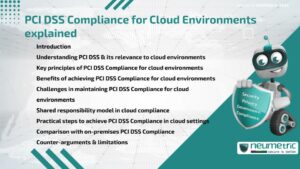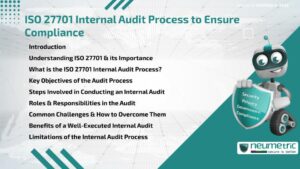Table of Contents
ToggleIntroduction
The ISO 27701 Internal Audit process is a structured approach to verify whether an organisation’s Privacy Information Management System complies with international Standards. It helps evaluate Privacy Controls, identify Gaps & ensure Continuous Improvement. Organisations use this process to meet Compliance Requirements, protect Personal Data & demonstrate Accountability to Regulators & Stakeholders. By understanding its objectives, steps, challenges & benefits, businesses can successfully implement the Audit process & maintain Trust with Data Subjects.
Understanding ISO 27701 & its Importance
ISO 27701 is an extension of ISO 27001 & ISO 27002. It focuses on Privacy Information Management Systems [PIMS] & addresses how Organisations collect, process & secure Personal Data. With the rise of global Data Protection laws such as the General Data Protection Regulation [GDPR], adopting ISO 27701 provides a recognised Framework for Compliance.
Unlike basic Security Standards, ISO 27701 places emphasis on Personal Data & Accountability. It gives Organisations a structured way to demonstrate responsible handling of Personal Information & to show Regulators that they follow Best Practices.
What is the ISO 27701 Internal Audit Process?
The ISO 27701 Internal Audit process is a systematic review that checks whether the Privacy Information Management System is working as intended. It ensures Compliance with ISO 27701 requirements, verifies that controls are effective & highlights areas needing Corrective Action.
This Audit is not only about documentation but also about practical implementation. Auditors evaluate Evidence, Review Processes & interview Employees to confirm that Policies are being followed. This makes it a powerful tool for strengthening organisational Trust.
Key Objectives of the Audit Process
The main objectives of the ISO 27701 Internal Audit process include:
- Confirming Compliance with ISO 27701 requirements
- Identifying Risks related to Personal Data handling
- Testing the effectiveness of Privacy & Security Controls
- Ensuring Policies & Practices align with regulations like GDPR
- Supporting Continuous Improvement within the PIMS
An effective Audit helps uncover hidden Vulnerabilities that could otherwise lead to Penalties, Breaches or loss of Trust.
Steps Involved in Conducting an Internal Audit
Conducting the ISO 27701 Internal Audit process generally involves the following steps:
- Planning – Define Scope, Objectives & Audit criteria.
- Preparation – Collect relevant documentation such as Policies, Risk Assessments & previous Audit reports.
- Execution – Perform on-site or remote Audits, Review Procedures & interview Staff.
- Reporting – Document findings, classify Non-Conformities & suggest Corrective Actions.
- Follow-up – Ensure identified Gaps are corrected & improvements are sustained.
Roles & Responsibilities in the Audit
The ISO 27701 Internal Audit process requires participation from different Stakeholders. Audit teams are usually independent of the operations they assess to ensure objectivity. Top Management provides support by allocating resources, while Employees cooperate by sharing information & demonstrating processes.
Internal Auditors are responsible for gathering Evidence, Analysing data & preparing unbiased Reports. In turn, Management must act on the findings to strengthen Compliance efforts.
Common Challenges & How to Overcome Them
Organisations often face challenges when implementing the ISO 27701 Internal Audit process, such as:
- Lack of Awareness about Privacy-specific requirements
- Resistance from staff due to increased oversight
- Difficulty in aligning Audit practices with Legal Frameworks
- Limited resources or skilled Auditors
Overcoming these requires regular training, strong communication & using external expertise when needed.
Benefits of a Well-Executed Internal Audit
When properly executed, the ISO 27701 Internal Audit process provides many benefits:
- Strengthens Compliance with Privacy regulations
- Reduces the Risk of Data Breaches & Penalties
- Builds Customer & Regulator Trust
- Encourages a culture of Accountability
- Supports Continuous Improvement in Privacy practices
These benefits not only protect the organisation legally but also enhance its reputation.
Limitations of the Internal Audit Process
Despite its advantages, the ISO 27701 Internal Audit process has certain limitations. It provides a snapshot of Compliance at a specific point in time & may not capture evolving Risks. Audits also depend on the skills & experience of Auditors, meaning outcomes can vary.
Additionally, Audits cannot eliminate Risks entirely but only highlight them. Organisations must follow through with corrective & preventive actions to gain the full value.
Takeaways
- Ensures Compliance with ISO 27701 requirements
- Strengthens Privacy & Data Protection practices
- Builds trust with Regulators, Customers & Stakeholders
- Identifies Risks & Areas for improvement
- Encourages Accountability & Continuous Improvement
FAQ
What is the purpose of the ISO 27701 Internal Audit process?
Its purpose is to verify Compliance with ISO 27701, evaluate Privacy controls & identify areas for improvement.
How often should the ISO 27701 Internal Audit process be conducted?
Audits are generally conducted annually, but frequency may increase depending on organisational Risks & Regulatory requirements.
Who can perform the ISO 27701 Internal Audit process?
Internal Auditors trained in ISO 27701 can perform it, though external experts may also be engaged for independence.
What documents are required during the ISO 27701 Internal Audit process?
Common documents include Privacy Policies, Risk Assessments, Training Records, Data Processing Agreements & previous Audit reports.
Does the ISO 27701 Internal Audit process cover legal Compliance?
Yes, it helps align practices with Privacy laws such as GDPR, but it should be supported by Legal consultation for full Compliance.
What are common findings in the ISO 27701 Internal Audit process?
Frequent findings include incomplete documentation, lack of awareness among staff & insufficient Data Protection controls.
Can small organisations benefit from the ISO 27701 Internal Audit process?
Yes, even small Organisations benefit by strengthening Compliance, building Customer Trust & reducing Risks.
Need help for Security, Privacy, Governance & VAPT?
Neumetric provides organisations the necessary help to achieve their Cybersecurity, Compliance, Governance, Privacy, Certifications & Pentesting needs.
Organisations & Businesses, specifically those which provide SaaS & AI Solutions in the Fintech, BFSI & other regulated sectors, usually need a Cybersecurity Partner for meeting & maintaining the ongoing Security & Privacy needs & requirements of their Enterprise Clients & Privacy conscious Customers.
SOC 2, ISO 27001, ISO 42001, NIST, HIPAA, HECVAT, EU GDPR are some of the Frameworks that are served by Fusion – a SaaS, multimodular, multitenant, centralised, automated, Cybersecurity & Compliance Management system.
Neumetric also provides Expert Services for technical security which covers VAPT for Web Applications, APIs, iOS & Android Mobile Apps, Security Testing for AWS & other Cloud Environments & Cloud Infrastructure & other similar scopes.
Reach out to us by Email or filling out the Contact Form…





